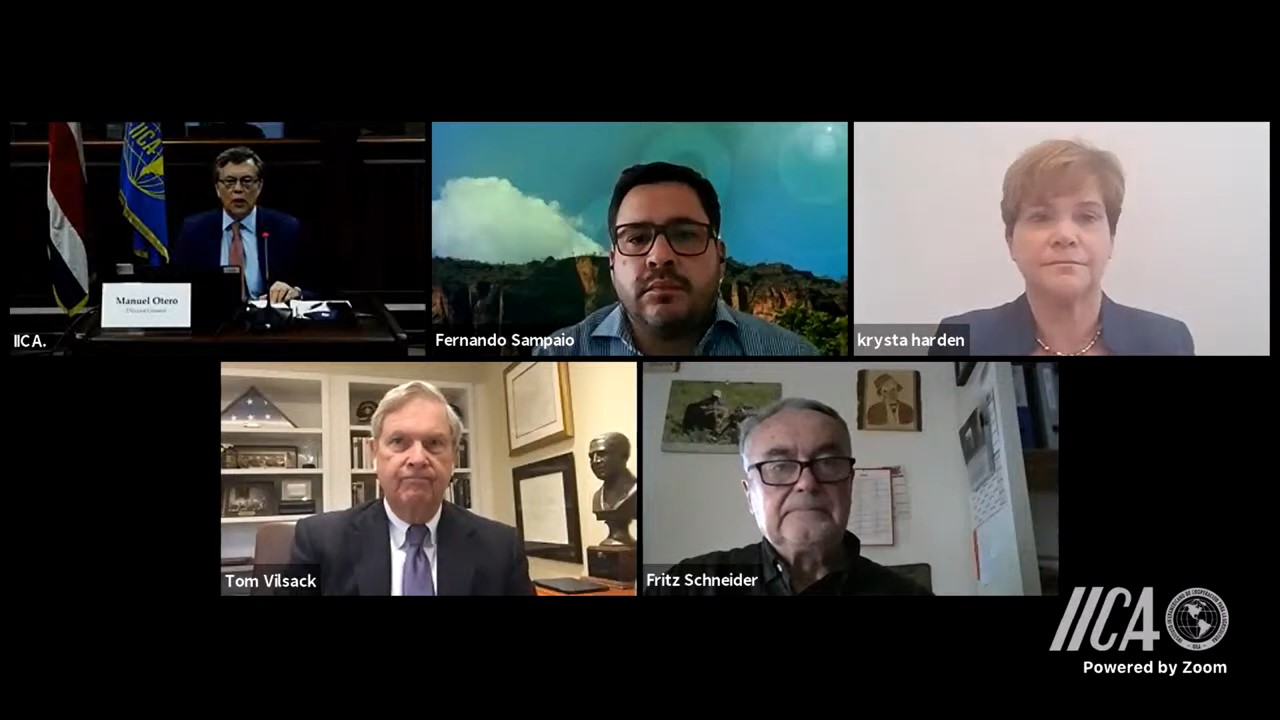Attending the meeting were Tom Vilsack, former United States Secretary of Agriculture and CEO of the U.S. Dairy Export Council; Ted McKinney, U.S. Under Secretary of Agriculture for Trade and Foreign Agricultural Affairs; Fritz Schneider, Chair of the Global Agenda for Sustainable Livestock; and Manuel Otero, Director General of IICA, among other specialists.

San Jose, 23 October 2020 (IICA). Livestock production and animal protein are essential for agricultural systems and rural communities in the Americas, contributing to the food and nutritional security of the population, as well as to the economic, social, cultural and environmental development of the region. This was the consensus among authorities and experts who were meeting at the invitation of the United States Dairy Export Council (USDEC) and the Inter-American Institute for Cooperation on Agriculture (IICA).
The occasion was a high-level virtual meeting organized to share scientific knowledge, research and technical expertise about the importance of livestock production and animal protein to a sustainable food system, as well as to discuss future opportunities and challenges for the sector.
The seminar was attended by Tom Vilsack, former United States Secretary of Agriculture and CEO of the U.S. Dairy Export Council; Ted McKinney, U.S. Under Secretary of Agriculture for Trade and Foreign Agricultural Affairs at the U.S. Department of Agriculture (USDA); Fritz Schneider, Chair of the Global Agenda for Sustainable Livestock; and Manuel Otero, Director General of IICA, as well as a host of experts in the field, representing the public and private sectors, academia and the research domain, among others.
Discussions during the two-day event addressed sustainable production; innovation; research and development to support this activity; nutritional and human health implications of animal protein; farmer perspectives and priorities; socioeconomic development and livestock farming in the Americas, as well as consumer perceptions about livestock farming.
“I certainly want to recognize IICA’s efforts in elevating people’s understanding about the importance of livestock production and in enhancing their appreciation of animal protein, not only at the level of sustainable production, but also its role in reducing poverty and building stronger economies in developing countries”, said Vilsack. “There is no question that animal protein and livestock farming can provide a source of wealth creation in countries; can reduce poverty and has significant nutritional value”.
“It is important for people to understand the commitment that producers in the hemisphere have made to sustainable production, to reducing greenhouse gas emissions, as well as to lowering their carbon dioxide footprint; and they are succeeding”, he said.
McKinney zeroed in on the importance of innovation “to boost productivity sustainably” in the meat and dairy sectors and also agreed that balanced diets should not “focus solely on vegetables and forget about all of the products that come from our livestock and poultry sectors”.
The specialists were also of one accord that decision-making and rules should be science-driven, in support of consumer safety and health. Most of all, information about the role of livestock production and animal protein in nutrition should be accurate, given that information is often distorted by arguments against consumption of these foods, without any scientific basis.
Schneider, who is the Chair of the Global Agenda for Sustainable Livestock, maintained that, “Livestock production systems are relevant for all the Sustainable Development Goals. The importance of livestock farming in feeding the world needs to be emphasized again and again and this webinar will be an important step in the direction of ensuring better preparedness. Providing scientific evidence is critical to better preparedness, planetary health, resilience and a holistic approach”.
“Science will always be the answer to tackle biased information. We must look at the science behind the sustainable livestock production systems of the Americas, to explain how they are creating wealth and development. We firmly believe that agricultural production and animal protein are essential for agricultural systems and rural communities throughout the hemisphere”, added Otero, who heads the specialized agency for agriculture and rural affairs.
The seminar made it clear that the consumption of animal protein is essential to a proper diet and nutrition, as they are a major source of highly bioavailable proteins, minerals and essential vitamins.
For example, it was stated that the intake of dairy products is linked to a lower risk for conditions such as type 2 diabetes and hypertension. It contributes to increased bone mineral density in children and adolescents; provides cardiovascular and muscular benefits and boosts immune functions.
Moreover, at the socioeconomic level, close to 800 million rural inhabitants depend on livestock rearing and the sector accounts for 46% of the agricultural GDP of Latin America.
The livestock industry is also linked to poverty reduction at the family and community level, as well as to socioeconomic development and job creation.
IICA will compile the information arising out of the seminar into a publication that will be presented at the proposed United Nations (UN) Food Systems Summit, which will aim to sensitize the public and to adopt commitments to transform these systems, with a view to eradicating hunger and reducing the incidence of food-deficiency diseases.
The event, presentations and additional information on the webinar are available here.
More information:
Horrys Friaca, International Specialist of IICA’s Agricultural Health and Food Safety Program (AHFS) at IICA.
horrys.friaca@iica.int











